Britain's landscape is dotted with towns and villages whose names evoke laughter, curiosity, and sometimes a bit of blush.
From the rolling hills of Worcestershire to the quaint corners of Northamptonshire, these places carry monikers that range from cheeky to outright risqué.
The origin of many place names in the UK date back to Anglo-Saxon or Old Norse times and while they might not be pronounced exactly the same today, can be traced back to Celtic, Roman and old Viking settlements. In some cases, the original meaning of the name has evolved over time, taking on a more vulgar connotation.
Can place names be changed?
There are no laws in the UK regarding the changing of place names, even if they're considered rude. However, the decision to change a name typically involves local councils and residents, and there can be resistance to altering historical names.
Back in 2018, the mailonline reported: “Yesterday residents living on a road called Bell End in Rowley Regis, West Midlands, claimed the name of the street has depressed house prices by as much as £60,000.
They also claimed children are bullied at school because fellow pupils found out they lived on Bell End and so have launched a petition urging the council to rename it.” However, as thousands signed a counter-petition to keep the historic name, at the time of writing, the name remains.
Britain's rudest and funniest place names:
With the help of the University of Nottingham’s Key to English Place Names and the Dictionary of British Place Names, we examine the etymology behind some of the nation’s foul-mouthed farmsteads and vile villages.
Here is our pick of the funniest and rudest place names in the UK to amuse your friends or help win the pub quiz.
Bell End
Google Maps shows several locations for Bell End: A street in Rowley Regis, as mentioned in the introduction, Bell End Service Station in Stourbridge, Worcestershire and a road about 100 metres long in Wollaston in Northampton, which is named after the now-closed Bell Inn pub.
Bitchfield
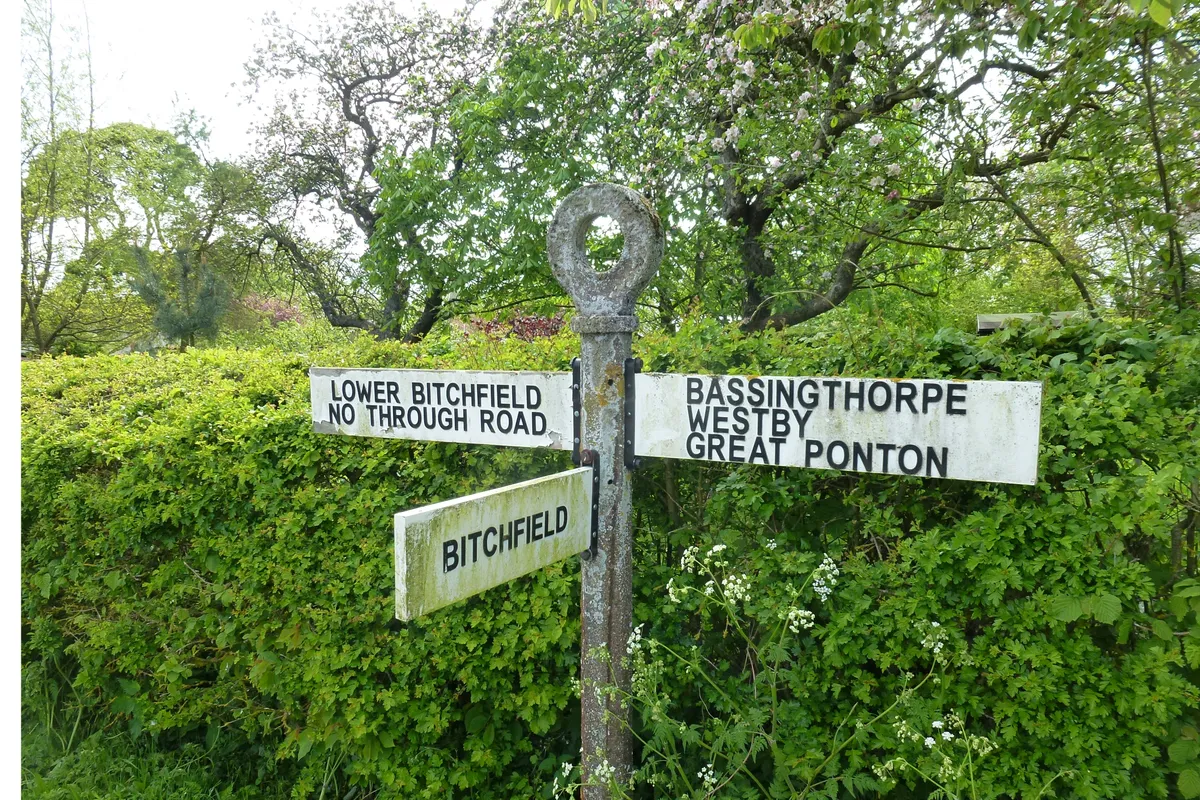
Originally appearing in the Domesday book as Billesfelt, this small Lincolnshire village forms a parish with Lower Bitchfield. As with many places in Britain, over the centuries its pronunciation and meaning has changed.
According to the Dictionary of British Place Names, the moniker initially signified that it was the open land of a man called Bill: Bills-felt. Alternatively, it could be from Old English, meaning Bill referred to a word for sword, synonymous with the description of a sharp ridge or prominent area of land.
So contrary to the modern interpretation suggesting a field of female dogs or unpleasant women, Bitchfield describes and area of open land, belonging to a mystery man by the name of Bill, or simply open land on raised ground.
Butthole Lane
Butthole Lane in Leicestershire boasts a rather wholesome origin story. Contrary to what your snickering inner voice might suggest, the name likely comes from the Old English word "butt," which referred to a target for archers. Imagine brave archers perfecting their aim on Butthole Lane centuries ago!
There was also a Butt Hole Road in Conisborough, which most likely referred to a historical "butt," or a large communal water container in the town. Unfortunately, the modern interpretation of "butt" overshadowed the historical meaning.
Fed up with the endless amusement (and perhaps a few delivery mix-ups!), the residents decided to take action. They raised funds privately, got council approval, and in 2009, the infamous Butt Hole Road was officially renamed Archers Way.
Cockermouth

This small historic Cumbrian town Cockermouth, which sits on the edge of the Lake District, owes its name to the River Cocker. Two of its most famous sons are the famous poet William Wordsworth, who was born here, and Fletcher Christian, the man who led the mutiny on ‘The Bounty’.
Cocks
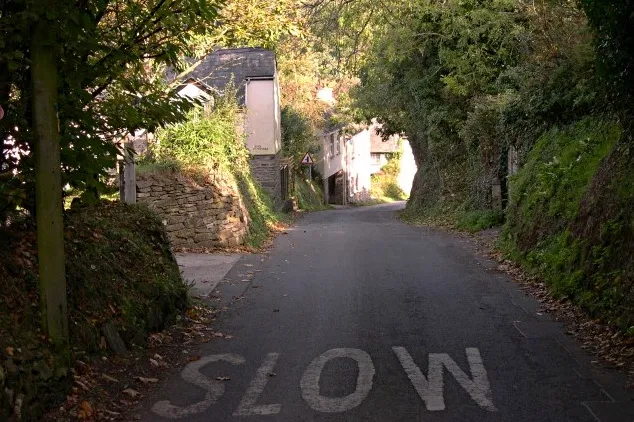
Coming from the Old English for heaps or hillocks, Cocks is most likely a modern spelling of the word Coccs. The area around this tiny village, the parish of Perranzabuloe on the north coast of mid-Cornwall, is rather hilly, so this one is pretty self-explanatory.
Strengthening that view is the road called Cocks Hill, one of the many examples of a name repeating itself when a new wave of invaders did not understand the language of the previous occupiers. For example, the Cheddar in Cheddar Gorge means gorge, the Canvey in Canvey Island means island, and the Beachy in Beachy Head means beautiful headland.
Fanny Hands Lane
Located in Ludford, it’s now known as Five Hands Lane, the lane's name is said to have originated from landowner John Hands' marriage to a woman named Frances. It was common at the time for "Frances" to be nicknamed "Fanny," and John likely named the street after his wife.
Fanny Barks
Fanny Barks, located near Darlington in County Durham, UK, is a place with a distinctive and humorous name that likely derives from the names of former landowners or notable local figures.
Fingeringhoe
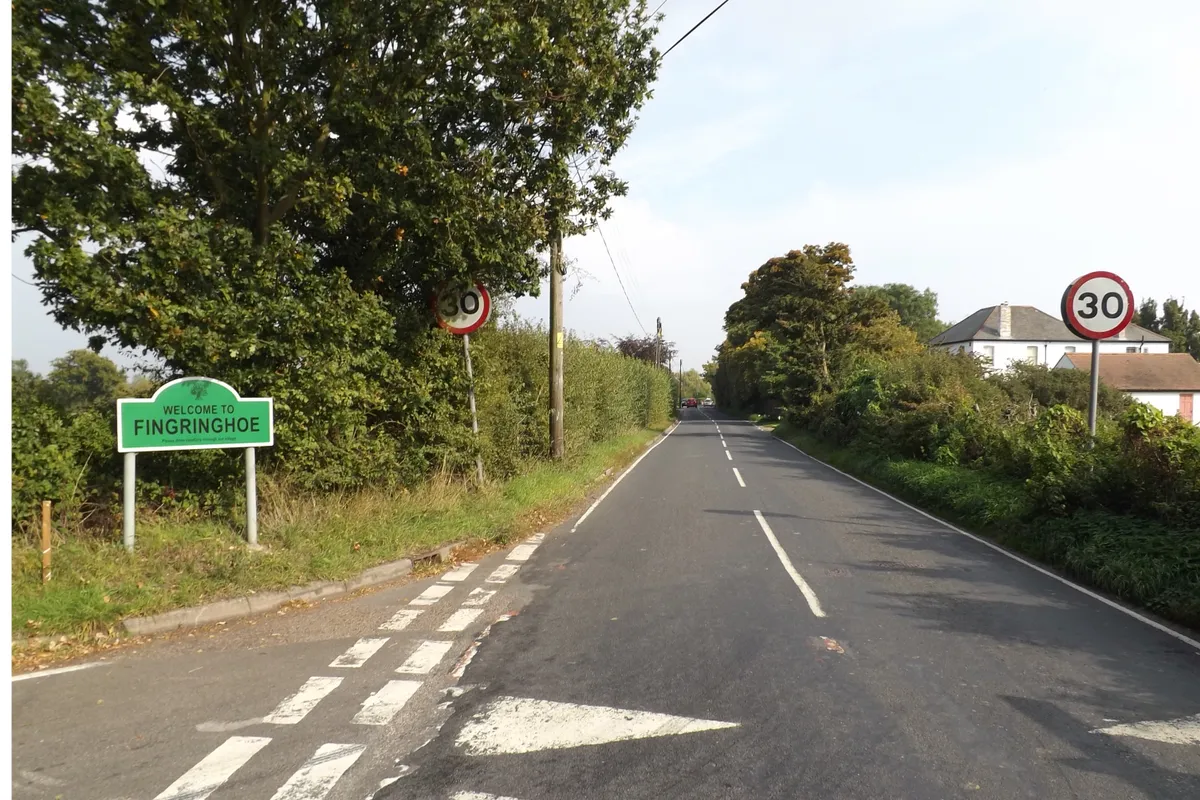
Any place name with an “ing” in it refers to the people of a certain person or location, from the Old English “ingas”. Similarly, “hoh”, or “hoe” as it has become here, refers to a heel or protruding piece of land.
The village of Fingringhoe is set on a small bend in the river, possibly the heel of land that the name refers to. The bodily reference is continued with “Fingr”, which means finger. In this case, it’s probably a finger of land with this part of Essex a network of rivers and streams winding their way into the Thames estuary.
The village has a nature reserve, Fingringhoe Wick, which is a popular spot for birdwatchers and nature enthusiasts.
Great Cockup
Great Cockup, despite its unfortunate title, resides in the picturesque Lake District of northwest England. Nestled amongst the Uldale Fells, this fell (a fancy term for hill or mountain in these parts) stands at a respectable 526 meters. The source of its name is a bit hazy, but the most likely explanation is rooted in Old English, translating to "blind valley frequented by wild birds." So, instead of a monumental blunder, Great Cockup might have simply been a peaceful haven for our feathered friends.
Lickey End
Lickey End is a village with a uniquely amusing name that often piques interest. The name likely has historical roots, possibly connected to the nearby Lickey Hills, which are known for their natural beauty and recreational opportunities.
Lower Swell
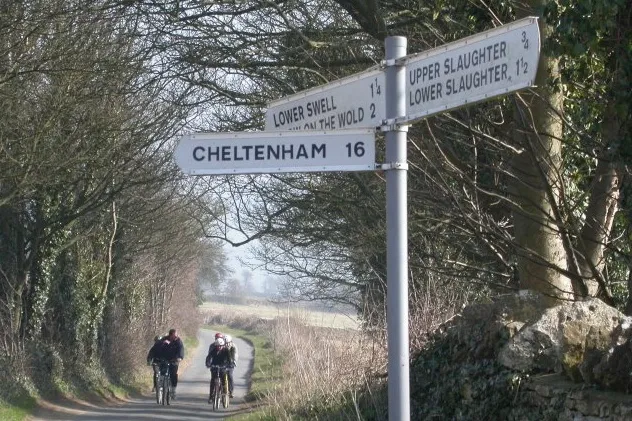
There are a handful of theories regarding this Gloucestershire village’s name. A “swelle” is an old English word used to describe a mound, literally a swelling of the ground. It is possible that Lower Swell comes from this and its location in relation to local hills, situated on the lower of the hill, or at the bottom of the high ground.
Another theory suggest that it comes from the Anglo-Saxon word “well” meaning spring or well. There is a spring nearby called the Old Lady’s Well, perhaps Swell is a contraction of that name.
Victorian historian Daniel Henry Haigh, an Anglo-Saxon expert, proposed that there was a battle fought near the village by Offa of Mercia. After the battle, he thought that the dead were buried and burnt on the ground where the village church now stands. Haigh believed that Swell was an Anglo-Saxon word for burning or funeral pile. In the Middle Ages the village was known as Little Swell and perhaps the name referred to the place where this small, morbid fire was constructed.
Netherthong
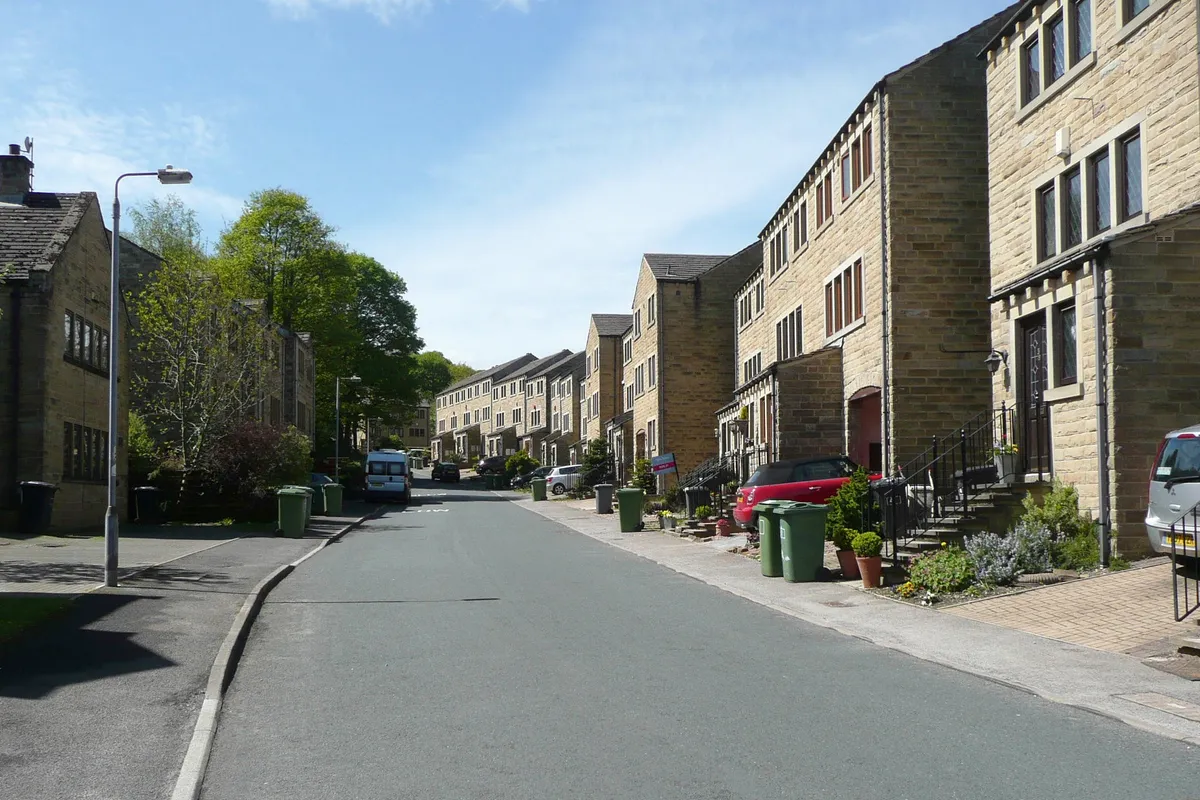
This Yorkshire village is rather simple to decipher: Nether, meaning lower, and thong meaning a thin strip of land rather than a skimpy undergarment. The Nether exists simply to differentiate the village from the nearby Upperthong, which is on higher ground.
Nether Wallop
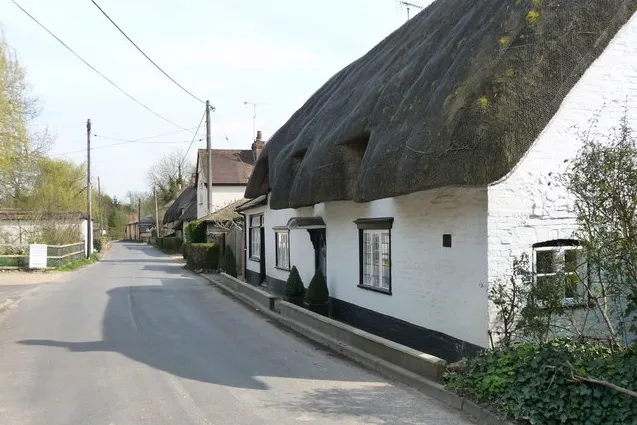
The rather painful sounding Nether Wallop brings an eye-watering thought to the Hampshire countryside.
It was referred to as “Wollop Inferior” in the Doomsday book and sits on the banks of Wallop Brook, which rises to the surface at nearby Over Wallop.
The term Wallop itself comes from old words for stream (waella) and valley (hop). The Nether part of the name comes from its location, the most southerly - or lower - of the three Wallops.
Despite what the name suggests, it is not a place where people would be punished by blows to the more sensitive areas of the body. Instead, Nether Wallop roughly means the lower village in the valley with the spring.
Penistone
Penistone, nestled near Sheffield, might just be the most suggestively named town in Yorkshire (and that's saying something!). While Sheffield boasts its industrial prowess, Penistone - pronounced 'penny - stun' - raises a whole different kind of flag... a flag some might find a tad too revealing.
Now, before you pack your bags for a weekend of, ahem, "exploration," it's important to note that Penistone's name likely has more innocent origins. Theories suggest it comes from Celtic words meaning "hill" and "stone," a rather unarousing explanation compared to the modern interpretation.
The River Piddle and the Piddle Valley
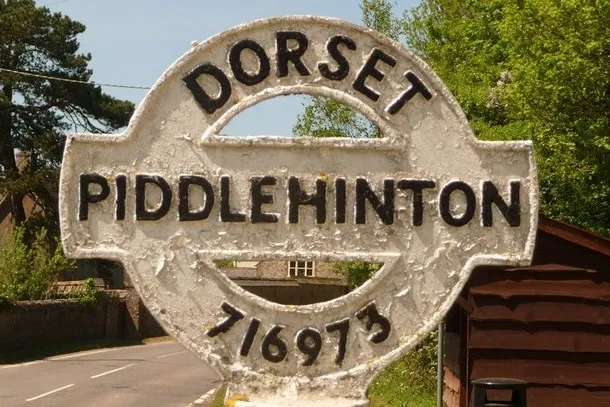
Dorset is home to many an odd place-name and none more so that the likes of the villages surrounding the River Piddle. It is unlikely that this region is so-called due to the contents of the river, although not impossible given what we learnt about other places on this list.
What is more probable is that places like Piddlehinton and Piddletrentide, along with fellow piddle valley dwellings Puddletown and Tolpuddle, evolved from a combination of an old English word for marsh, fen or ditch, “pudd”, and the villages’ location on the river.
Piddlehinton in particular consists of the geographical reference to its proximity to the River Piddle, and to “hiwan”, the members of a family or household, and “ton”, an enclosure, farmstead or village.
In short, Pidddlehinton is probably referring to the farm of the family by the river.
Pratts Bottom
Pratts Bottom is a village in Greater London, England, within the London Borough of Bromley. The village's name is derived from the Pratt family who lived in the area in the 14th century, and "bottom" in this context refers to a valley or hollow. Prior to the 19th century, the village was even on a toll road between London and Hastings, frequented by smugglers and highwaymen, with Dick Turpin himself a rumoured patron of the local pub.
Scratch Arse Ware
Scratch Arse Ware is an area of sloping limestone hills in Purbeck, Dorset, that's very popular with walkers and hikers for its phenomenal sea views leading down to Dancing Ledge. 'Ware' is an old English term for rough grazing pasture – as for the rest of the name, you'll have to fill it in with your imagination.
Sheepy Parva and Sheepy Magna
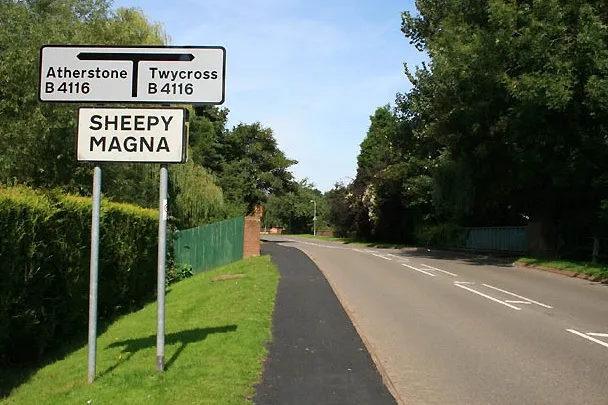
These two Leicestershire villages are, as the name suggests, strongly tied to a history of sheep farming. Magna and Parva simply mean big and small in Latin, while the Sheepy part comes from the Anglian words for Sheep, “scep” and island, “eg”. Eg didn’t necessarily mean island in the middle of a lake or ocean, it could also refer to dry land in a marshy area. It is likely that these villages were originally sheep farms in amongst a largely undrained, waterlogged area.
Shitterton
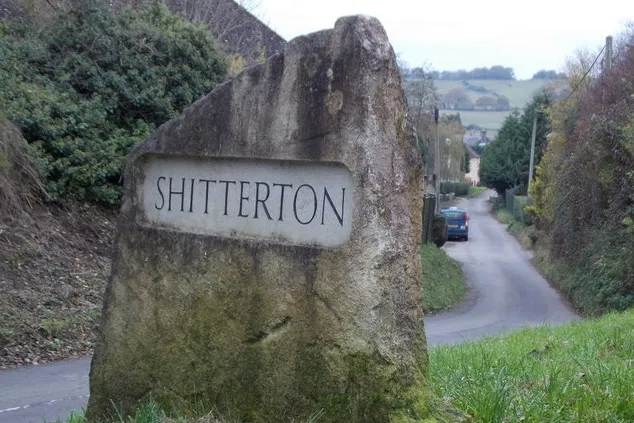
This one does what it says on the tin, or should that be can?
Shitterton probably derives from the Old English “scitere” meaning sewer or a stream used as an open sewer and ton (modern equivalent being town) is, obviously, a word used to describe a village, estate or large farmstead. This was quite literally, the place by the sewer.
In 2010, villagers in the Dorset hamlet of Shitterton got so fed-up with their sign being stolen they put up a stone version.
Slag Lane
The name, Slag Lane, in Lowton, Warrington, likely stems from the area's coal mining past. One theory suggests it was named after a local poet, John Byram's family, who had the dirt track covered in coal slag from nearby Bickershaw Colliery. This practical improvement solidified the name "The Slag Lane."
Titty Ho
Titty Ho, located in Northamptonshire, UK, is another place with a distinctively humorous name that captures attention. The origin of the name is not definitively documented, but it is likely to have historical or linguistic roots similar to many other quirky English place names.
Twatt
Despite its rather...colourful name, Twatt in Orkney, in the Shetland Islands of Scotland, is a perfectly delightful little place. Its charm lies not in hidden coves, but in the surprising history behind the name. But, history suggests we should forget rude jokes – Twatt actually comes from the Old Norse word "thwaite," meaning a small clearing or piece of land.
The locals in Twatt seem unfazed by name, and if you’re looking for a souvenir, head off to Orkney’s Sporting Goods on Stromness, or visit their online shop.
Wetwang
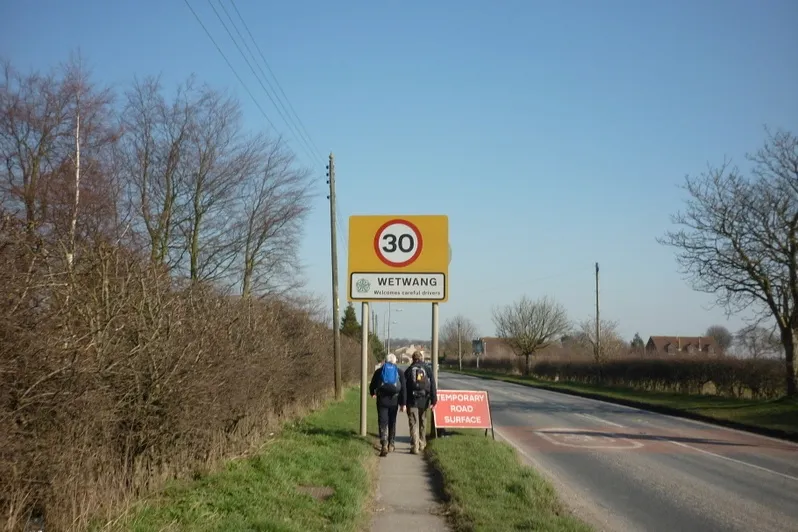
This is a famous village in the East Riding of Yorkshire because of its unusual name. It even features on a local commercial radio station’s jingle.
It appeared in the Doomsday book as Wetuuangha and there are two plausible theories behind its name:
- One is that it directly derives from the Old Norse word vaett-vangr, which describes a field for the trial of a legal action. It is quite possible the name has simply stuck and altered only very slightly since the time of the Viking invasion and settlement in the area.
- The second idea is that Wetwang was simply the Wet Field opposing the nearby Dry Field that became Driffield.
Upperthong
Nestled amidst the rolling green hills of Yorkshire, not far from the town of Holmfirth, lies the quaint village of Upperthong. Beneath this potentially giggle-inducing moniker lies a peaceful community known more for its annual welly wanging championship than anything else.
In this feature, we delve into the stories behind some of Britain’s rudest place names, exploring their origins, local folklore, and the unique charm that keeps these names alive in the collective imagination. Join us on a journey through these humorously named locales, where every signpost tells a tale and every giggle hints at a rich and colourful past.


